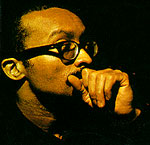West of Rome
| |

|
[Tragedy, passion, relegation] [Oriflammes and Dithyrambs] It's a substance that seeps through every groove of the thick black vinyl of my copy of Astral Weeks. It's a record that urgently needs to be replayed and wondered at. While Van Morrison is no doubt living a stone's throw from the likes of dubious Eddie Irvine these days, hearing the record again reminded me of the jazzy possibilities he was exploring. In his own way he was staging a musical breakthrough into ecstatic rapture that is all too rare today. Punishing and pummelling into submission the instruments of his craft, literally biting the hands that feed him in the course of this epic emotional workout. Not many outside Cecil Taylor could aspire to these heights of destructive frenzy, and in Van's case he couldn't sustain this momentum. It has the stamp of an authentic beginning all over it, while Cecil begins every performance as if the end has already been reached and nothing remains but to reenact that utter surrender into profanity and physical contortion. Taylor the ballet dancer, feeding his machine-gun reflexes into the seductive body of his instrument. Van singing at every opportunity of the red shoes of the dancer, the ballerina in a frenzy of implosive movements. The vibes feature heavily here, trickling or hammering their path of memory pain into the stitches of these songs. The stargazing goatherd composes his songs of pain and reverie, stuttering on the outside of language, leaving faint clues as to the origins of his howls or entranced words. Cecil Taylor pursues the same obsessive lengths of verbal diaspora in his poetry, as heard on such records as Tzotzil Mummers Tzotzil. Whatever the cause of his lament, it's profound, hurts like a dental extraction without anaesthetic and refuses to let you go. Similarly, Van stages meandering encounters with his anathemas and exorcisms, leaving a temporary breath of repose with the fade-out of 'Slim Slow Slider'. A slithering work in progress, a rattlesnake torn apart by wolfhounds, but the rattle twitches still, taunting its predators. |

| [Return of Django] I hate straight homages and thoughtless, redundant cover versions in all forms of music, so why should the Ark of Free Jazz be ransacked without engaging with the substance of the music first? In interpreting the likes of Monk and Ayler on solo piano albums for Soul Note, Gaslini has thrown away the rulebook and the commonplace lines of attack. His approach to Monk is delivered from an archly skewed perspective, tongues of flame playfully licking around familiar themes like 'Round About Midnight' (a later vocal version is sublimely translated as 'E Quasi Mezzanotte, Mister Monk') or 'Let's Cool One'. There's an eerie hint of horror mayhem at times when our solo pianist introduces unexpected percussive effects, making you sit bolt upright as you wonder where his encounter with the levitating spirit of Thelonious will lead him. His Ayler disc is similarly shocking, if for opposite reasons. He takes the core of Ayler's emotional content from the frenetic blaze of horns and drums and translates them for solo piano. In place of fire and brimstone he plots carefully charted lines of rhapsodic intent. For him Ayler's is the music of transport, emotional and physical. It shouldn't be contained within the confines of a 'free' tradition which can be as much of a straitjacket as a liberation. Finally, Ayler's muse is a thing of flitting grace, momentary hints of enlightenment, ghosts plying found memories and lost objects from voice to voice. His new venture is another thing of reckless invention and beauty. Enigma, again on the impeccable Soul Note, features his Proxima Centauri orchestra of crack Italian jazz marksmen. Alberto Mandarini and Warner Borgia on trumpet are surely assumed names, and they bring a harlequin verve to their roles in these new creations. Gaslini finds room to tackle Sun Ra's beguiling 'Lanquidity' in this foreign setting. The reworking bustles with intuitive energy, like a trader in a Neapolitan street market with a new crop of peaches to sell and none to give away to plain-clothed Popes (there's a killer scene in Ringolevio that retells that true story). There's a spiky interplay between his horned forces and the obligatory vibes on the 'Enigma' suite itself, showing how he hasn't lost his determination to blend the chromatic, post-serial and atonal into a challenging rainbow of thematic devices and reflective interludes. Still, such is the man's control of his unit, there is plenty of space for individuals to improvise around his leading voice on piano. This isn't the bombastic rhetoric you'd associate with Hammer horror, more the gently corrupting interrogation of innocence and disguise in a Val Lewton film. Gaslini takes us on a marine voyage across the wide Sargasso sea. He may walk with the zombies, but these flesh-eating herds don't bite here. Just remember to put out the garlic. © Marino Guida 2002 |